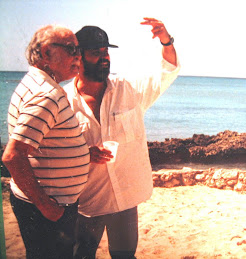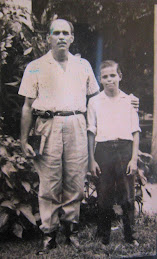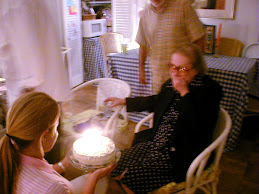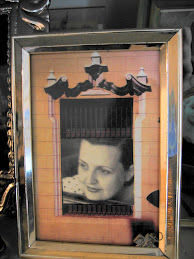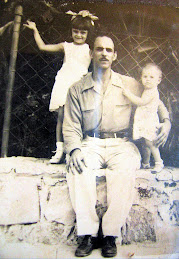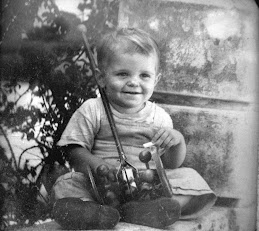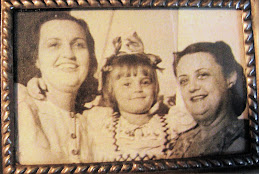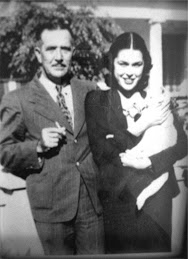



After a brief Summer and failed stint in New York (more about it in another entry) after our arrival from Mexico -we finally settled in Miami. And those six and a half years were very difficult for all of us. In my memory I see them as a solid block of ‘good’ and ‘bad’ that defies description and details.
There were learning years! And there were mostly very sad years.
After we came back from New York we lived with my aunt for a couple of months, but their finances were so bad (my uncle was selling vacuum cleaners door to door and they were flat broke), that we decided to look for our own apartment and avoid being a burden for them. This is how we became tenants of a lavender ‘efficiency’ at the old and rickety “The Betty Apartments ” -on SW 9 St between 23 and 22 Aves., where the three of us slept in one room -on a couple of pull out old couches- and shared a tiny bathroom. Since I had found a job as a salesgirl at F.W.Woolwoth in Coral Gables, many of my American co-workers had contributed with old pots, pans, towels and sheets. And we finally had a home of our own!
It felt good being 'secure' under one roof -and even though the conditions were very humble, and we lived in squalor- I have sweet memories of those days and the kindness of all the neighbors in the small building. Sometimes it fell like we were living in some sort of ‘commune’ – an American version of a Cuban ‘solar’- because there were lots of opened doors, and comings and goings from one ‘efficiency’ to another.
And with the exception of one older married couple (who had a dilapidated car and took us all to church every Sunday) we were all Cuban families led by a single woman with young children. And we all helped each other very much. One of our neighbors was a lady called Obdulia, who had been the cook of one of my mother’s friends in Havana and now-- in exile, where Fidel made us really ‘equal’ and fortunes were reversed--was the soul and heart of the building. We spent in her home our first Christmas Eve Dinner away from Cuba --and when I look at that night’s small Instamatic snapshot of all the neighbors gathered around this teeny table, adorned with a small Cuban flag, I realize we all had terribly sad faces.
To this day, everytime I visit Miami I drive by “The Betty” and check it out. Now it looks better than when we lived there, and (almost like a ritual) -I always take pictures of it --and tell my patient daughter the same stories one more time!
My job at F.W. Woolworth was not a happy one, because the older American ladies who worked there were very weary of the young Cubans who were practically working for nothing (well below the minimum wage) --and logically, they made my life as difficult as they could. Since I spoke English, French and Spanish, the Store Manager -a handsome lecherous old man called Mr. Gurley- thought the best place for me would the ‘Cosmetics Counter’ (selling Maybelline, Tangee and teeny bottles of Evening in Paris) and he also ordered me to advertise the store specials through the PA system --in the three languages! Later on -after he forcibly kissed me and harassed me during the store Christmas Party, while he was totally drunk- and I pushed him away , he decided to ‘punish me’ and transferred me to the Snack Bar, where I started my days at the store’s kitchen, picking up supplies to slice ham, cheese, salami, lettuce, tomatoes etc -to prepare 4 dozen of ‘ hoagie sandwiches’ for the ‘lunch crowd’- plus huge boxes of pizza shells, enormous cans of pizza sauce, hundreds of ‘hot dogs’ and jugs of coke and grape syrup.
From talking in French to the crowds, soon I was feeding them! From ‘cosmetics expert’ I turned ‘short order cook’ in a matter of weeks!
Although I was qualified for a much better job, I was terrified of even looking for one and I stayed at Woolworth for almost 2 years. Security was paramount for all of us, so I did not care if my salary was only 43 dollars a weeks, which became 37 dollars after taxes! Of this I gave mami 35 and kept 2. Those 2 dollars were enough for ‘transportation’ for 4 days, so the fifth day of work I had to find ‘a ride’ with someone, or walk to work about 5 miles. I was lucky that a very kind and beautiful young Cuban girl called Maria Domínguez also worked at the store (at the Stock Room) and she was so friendly and helpful that very soon she was picking me up and taking me back home at the end of the day. Since she worked from 8 to 4 and I worked from 10 to 6, we both stayed over the extra hours to facilitate the arrangement –plus I got to save my 2 dollars every week!
I brown-bagged an American cheese sandwich for lunch every day and -one day a week- my job at the Snack Bar entitled me to eat ‘hot food’ from the store’s Soda Fountain, which was the biggest treat of the week. I still remember looking forward to the delicious meat loaf and mashed potatoes, or the open turkey sandwich with gravy I would ‘devour’ one day a week, sitting on the soda fountain stool like a regular ‘paying customer’!
I could also take home the unsold ‘hoagies’, so every morning - under the coaxing of ‘savvy’ Lourdes, the other Cuban woman who worked with me at the Snack Bar. So we made at least a dozen more sandwiches than necessary, to make sure at the end of the day we could take home 3 or 4 of them!
Maria Domínguez was pretty and funny. With huge blue eyes and brown curly hair she was skinny and lanky. I vividly remember that one day she told she had bought herself “a plot in the cemetery” which she was paying on monthly installments, because she was “27 years old and by now I am old maid and nobody is going to marry me, so I have to think about my future alone” . She had been in Miami for a while, her family (they were from Banes) had a little more money than us (her also beautiful sister worked in a bank as a cashier and had married ‘un americano’); so she never accepted any money for the ‘car service’. Soon we became good friends, she was introducing me to her own friends and all of us were going to the beach on Sundays (South Beach, which in 1963 was as un-trendy as one can imagine!) --and afterwards to the 25 cents movies at the “Cameo Theatre” on Washington Avenue. We were young, mostly ‘broke’ and with huge amounts of energy and ‘joie de vivre’. Been ‘poor’ was not a problem, nor a ‘social stigma’, because in 1965 90% of the Cubans in Miami were poor -and we all shared stories and funny anecdotes about it.
My mother -after working as baby sitter, laundress, companion to an old lady and picking tomatoes in a tomato farm in Pompano Beach (where she fainted and fell to the floor, thus having to leave the well-paid job all Cubans wanted to have!)- had found a job as the ‘candy girl’ at the Miami Theatre on Flagler St., where she became the Queen of Popcorn and where most of the employees were Cubans. One of the ushers had been a ex-Ambassador; the other a famous engineer; the cashier was a very uppity ‘society’ lady and the Candy Counter was shared by Mami and a sweet old American lady called Thelma, whose son was in prison at the time. Mami had to work from 2pm to 10pm, never made the ‘minimum wage’ either and- since we never had a car in our almost 6 years in Miami- had to ride the bus to and from work. (One night she was assaulted and robbed in the corner of our house around 11pm)
León had a paper route of The Miami Herald before school, sold the Miami News after school at the corner of SW 8th St and 8th Ave (‘8 y 8’), in the evenings was a ‘pastry boy’ at the posh Barcelona Hotel --and on Saturdays cleaned bathrooms in a small Cuban cafeteria on 8th St. called San Juan Bosco, owned by Leonard, a friend of my dad. The place was located near our house and Leon worked in exchange for a free meal --although he later was fired “because he ate too much”.
During those early years in exile, Cubans of all classes, backgrounds and educations forgot all the pre-conceived ideas about social standings and we all worked at whatever was necessary to survive. This courageous spirit created the ‘rebirth’ of Miami, a city that was practically dead when we got there! And in retrospect I feel very proud of the way we all reacted in such difficult and sad circumstances and raised to meet -and surpass- the challenge.
We were all so poor that pennies were carefully counted and everyone knew that some things -like going to restaurants, to the movies, buying clothes or buying an ice cream in the corner shop were totally off limits...Out of the question!. In exile, rich, middle class and poor Cubans became “very- poor-struggling-Cubans”, but we were rich in freedom, hopes and dreams, which under Communism would have been impossible to even fathom.
So our lives became very simple --and a daily challenge to face. For the younger generation like my brother’s -who was 14- the priority was going to school and having part-time jobs. My mother’s generation threw themselves into the fight for survival without looking back, doing anything and tackling any job that came their way, while trying to hold together a family and the semblance of a ‘home’. That was the most difficult part, since we were still rootless and many families were divided.
It was difficult to find in Miami a ‘complete’ and ‘whole’ family! Husbands and wives were separated; children and parents did not see each other for years and an example of this are the so called “Pedro Pan Children”, around fourteen thousand of small children who left Cuba totally alone, to be placed in homes or schools all over the United States, where most of them grew up to be very successful and today lead exemplary lives. It was something we are proud of now, almost 50 years later, but extremely traumatizing and painful at the time.
Many people had a worse tragedy, having parents, husbands, mothers or sisters in Castro’s prisons, serving long and cruel sentences, while others had been shot or killed or had died trying to escape the island. We were lucky in a way because with the exception of my father’s very revolutionary brother Raúl, who had been condemned to 12 years, we did not have that added pain to our lives. The three of us were together, very close, surviving the best we could. But I still cried a lot when I was alone. I felt sad when I thought my father had stayed behind and my brother missed him so. And I missed the sense of permanency and security my home in Havana gave me. That sweet ‘cocoon’ feeling.
It is difficult to explain, but one can miss ‘a country’ and hurt terribly about it. It’s like losing the earth under your feet and becoming a person who ‘floats’ like a helium balloon, without one single ‘iota’ of control over your life. Tremendously vulnerable.
When mami had fainted in the ‘tomatera’ and she was ‘unemployed’ and very sick for a few weeks I was terrified. We had no money to buy medicines and our eating habits were all wrong, so her recovery was very slow. American cheese, some sort of pressed meat in the style of Spam the Refugee Center gave away and neighbors passed on to us (remember we did not ‘qualify’ for any help!), corn flour, bread were the staple of our diets –plus the occasional hamburgers from a chain called “Royal Castle” where it was a treat to buy their 19 cents burgers and their 15 cents grits!.
I remember as a great ‘family outing’ merely going to church on Sunday mornings with my mother’s sister my Aunt Fela, my uncle Gustavo and our cousin Cristina and afterwards having ‘breakfast’ at Royal Castle. I can still visualize my very stylish Tafela, dressed to the nines with her still elegant ‘Cuban clothes’, holding on to her beautiful calfskin italian handbag, while standing in line behind the orange vinyl stools of Royal Castle’s, waiting for our turn to sit and eat our 69cents ‘full American’ breakfast of Bacon and Eggs or her favorite -and even cheaper- Chile con Carne!
When mami got sick, I was very scared that we were not going to be able to pay the $65 rent for our apartment at The Betty -our new and by now beloved ‘home’! I worried about being evicted or something worse. Mami’s salary was gone and my brother’s earnings barely paid for his lunches, dinners and school expenses. But (and I still dont understand how she could find strength to physically do it) as soon as she felt better Mami started taking care of an old lady called Mrs. Franzelle, who lived with her alcoholic daughter Ethel a few blocks away from our house. She was paid in cash --$18 a week! She also baby-sat for this Lebanese family who had a baby girl about 6 months old who had just had open heart surgery. Mami was worried about the baby’s delicate health (she had a huge thick scar from one end of her chest to below her navel) , but the parents did not seem to worry too much and used to go out very often, until very late at night, trusting their daughter’s care to my mother, who also was supposed to iron baskets and baskets of clothes for a paltry $1 an hour!
I used to go with her many times, just to keep her company, so she would not have to walk home in the dark at 2 or 3am. On one occasion the baby’s father drove us back home, and made a pass at my beautiful and still young mother, who -not speaking English- never understood him and I never had the heart to tell her.
After we came back from New York we lived with my aunt for a couple of months, but their finances were so bad (my uncle was selling vacuum cleaners door to door and they were flat broke), that we decided to look for our own apartment and avoid being a burden for them. This is how we became tenants of a lavender ‘efficiency’ at the old and rickety “The Betty Apartments ” -on SW 9 St between 23 and 22 Aves., where the three of us slept in one room -on a couple of pull out old couches- and shared a tiny bathroom. Since I had found a job as a salesgirl at F.W.Woolwoth in Coral Gables, many of my American co-workers had contributed with old pots, pans, towels and sheets. And we finally had a home of our own!
It felt good being 'secure' under one roof -and even though the conditions were very humble, and we lived in squalor- I have sweet memories of those days and the kindness of all the neighbors in the small building. Sometimes it fell like we were living in some sort of ‘commune’ – an American version of a Cuban ‘solar’- because there were lots of opened doors, and comings and goings from one ‘efficiency’ to another.
And with the exception of one older married couple (who had a dilapidated car and took us all to church every Sunday) we were all Cuban families led by a single woman with young children. And we all helped each other very much. One of our neighbors was a lady called Obdulia, who had been the cook of one of my mother’s friends in Havana and now-- in exile, where Fidel made us really ‘equal’ and fortunes were reversed--was the soul and heart of the building. We spent in her home our first Christmas Eve Dinner away from Cuba --and when I look at that night’s small Instamatic snapshot of all the neighbors gathered around this teeny table, adorned with a small Cuban flag, I realize we all had terribly sad faces.
To this day, everytime I visit Miami I drive by “The Betty” and check it out. Now it looks better than when we lived there, and (almost like a ritual) -I always take pictures of it --and tell my patient daughter the same stories one more time!
My job at F.W. Woolworth was not a happy one, because the older American ladies who worked there were very weary of the young Cubans who were practically working for nothing (well below the minimum wage) --and logically, they made my life as difficult as they could. Since I spoke English, French and Spanish, the Store Manager -a handsome lecherous old man called Mr. Gurley- thought the best place for me would the ‘Cosmetics Counter’ (selling Maybelline, Tangee and teeny bottles of Evening in Paris) and he also ordered me to advertise the store specials through the PA system --in the three languages! Later on -after he forcibly kissed me and harassed me during the store Christmas Party, while he was totally drunk- and I pushed him away , he decided to ‘punish me’ and transferred me to the Snack Bar, where I started my days at the store’s kitchen, picking up supplies to slice ham, cheese, salami, lettuce, tomatoes etc -to prepare 4 dozen of ‘ hoagie sandwiches’ for the ‘lunch crowd’- plus huge boxes of pizza shells, enormous cans of pizza sauce, hundreds of ‘hot dogs’ and jugs of coke and grape syrup.
From talking in French to the crowds, soon I was feeding them! From ‘cosmetics expert’ I turned ‘short order cook’ in a matter of weeks!
Although I was qualified for a much better job, I was terrified of even looking for one and I stayed at Woolworth for almost 2 years. Security was paramount for all of us, so I did not care if my salary was only 43 dollars a weeks, which became 37 dollars after taxes! Of this I gave mami 35 and kept 2. Those 2 dollars were enough for ‘transportation’ for 4 days, so the fifth day of work I had to find ‘a ride’ with someone, or walk to work about 5 miles. I was lucky that a very kind and beautiful young Cuban girl called Maria Domínguez also worked at the store (at the Stock Room) and she was so friendly and helpful that very soon she was picking me up and taking me back home at the end of the day. Since she worked from 8 to 4 and I worked from 10 to 6, we both stayed over the extra hours to facilitate the arrangement –plus I got to save my 2 dollars every week!
I brown-bagged an American cheese sandwich for lunch every day and -one day a week- my job at the Snack Bar entitled me to eat ‘hot food’ from the store’s Soda Fountain, which was the biggest treat of the week. I still remember looking forward to the delicious meat loaf and mashed potatoes, or the open turkey sandwich with gravy I would ‘devour’ one day a week, sitting on the soda fountain stool like a regular ‘paying customer’!
I could also take home the unsold ‘hoagies’, so every morning - under the coaxing of ‘savvy’ Lourdes, the other Cuban woman who worked with me at the Snack Bar. So we made at least a dozen more sandwiches than necessary, to make sure at the end of the day we could take home 3 or 4 of them!
Maria Domínguez was pretty and funny. With huge blue eyes and brown curly hair she was skinny and lanky. I vividly remember that one day she told she had bought herself “a plot in the cemetery” which she was paying on monthly installments, because she was “27 years old and by now I am old maid and nobody is going to marry me, so I have to think about my future alone” . She had been in Miami for a while, her family (they were from Banes) had a little more money than us (her also beautiful sister worked in a bank as a cashier and had married ‘un americano’); so she never accepted any money for the ‘car service’. Soon we became good friends, she was introducing me to her own friends and all of us were going to the beach on Sundays (South Beach, which in 1963 was as un-trendy as one can imagine!) --and afterwards to the 25 cents movies at the “Cameo Theatre” on Washington Avenue. We were young, mostly ‘broke’ and with huge amounts of energy and ‘joie de vivre’. Been ‘poor’ was not a problem, nor a ‘social stigma’, because in 1965 90% of the Cubans in Miami were poor -and we all shared stories and funny anecdotes about it.
My mother -after working as baby sitter, laundress, companion to an old lady and picking tomatoes in a tomato farm in Pompano Beach (where she fainted and fell to the floor, thus having to leave the well-paid job all Cubans wanted to have!)- had found a job as the ‘candy girl’ at the Miami Theatre on Flagler St., where she became the Queen of Popcorn and where most of the employees were Cubans. One of the ushers had been a ex-Ambassador; the other a famous engineer; the cashier was a very uppity ‘society’ lady and the Candy Counter was shared by Mami and a sweet old American lady called Thelma, whose son was in prison at the time. Mami had to work from 2pm to 10pm, never made the ‘minimum wage’ either and- since we never had a car in our almost 6 years in Miami- had to ride the bus to and from work. (One night she was assaulted and robbed in the corner of our house around 11pm)
León had a paper route of The Miami Herald before school, sold the Miami News after school at the corner of SW 8th St and 8th Ave (‘8 y 8’), in the evenings was a ‘pastry boy’ at the posh Barcelona Hotel --and on Saturdays cleaned bathrooms in a small Cuban cafeteria on 8th St. called San Juan Bosco, owned by Leonard, a friend of my dad. The place was located near our house and Leon worked in exchange for a free meal --although he later was fired “because he ate too much”.
During those early years in exile, Cubans of all classes, backgrounds and educations forgot all the pre-conceived ideas about social standings and we all worked at whatever was necessary to survive. This courageous spirit created the ‘rebirth’ of Miami, a city that was practically dead when we got there! And in retrospect I feel very proud of the way we all reacted in such difficult and sad circumstances and raised to meet -and surpass- the challenge.
We were all so poor that pennies were carefully counted and everyone knew that some things -like going to restaurants, to the movies, buying clothes or buying an ice cream in the corner shop were totally off limits...Out of the question!. In exile, rich, middle class and poor Cubans became “very- poor-struggling-Cubans”, but we were rich in freedom, hopes and dreams, which under Communism would have been impossible to even fathom.
So our lives became very simple --and a daily challenge to face. For the younger generation like my brother’s -who was 14- the priority was going to school and having part-time jobs. My mother’s generation threw themselves into the fight for survival without looking back, doing anything and tackling any job that came their way, while trying to hold together a family and the semblance of a ‘home’. That was the most difficult part, since we were still rootless and many families were divided.
It was difficult to find in Miami a ‘complete’ and ‘whole’ family! Husbands and wives were separated; children and parents did not see each other for years and an example of this are the so called “Pedro Pan Children”, around fourteen thousand of small children who left Cuba totally alone, to be placed in homes or schools all over the United States, where most of them grew up to be very successful and today lead exemplary lives. It was something we are proud of now, almost 50 years later, but extremely traumatizing and painful at the time.
Many people had a worse tragedy, having parents, husbands, mothers or sisters in Castro’s prisons, serving long and cruel sentences, while others had been shot or killed or had died trying to escape the island. We were lucky in a way because with the exception of my father’s very revolutionary brother Raúl, who had been condemned to 12 years, we did not have that added pain to our lives. The three of us were together, very close, surviving the best we could. But I still cried a lot when I was alone. I felt sad when I thought my father had stayed behind and my brother missed him so. And I missed the sense of permanency and security my home in Havana gave me. That sweet ‘cocoon’ feeling.
It is difficult to explain, but one can miss ‘a country’ and hurt terribly about it. It’s like losing the earth under your feet and becoming a person who ‘floats’ like a helium balloon, without one single ‘iota’ of control over your life. Tremendously vulnerable.
When mami had fainted in the ‘tomatera’ and she was ‘unemployed’ and very sick for a few weeks I was terrified. We had no money to buy medicines and our eating habits were all wrong, so her recovery was very slow. American cheese, some sort of pressed meat in the style of Spam the Refugee Center gave away and neighbors passed on to us (remember we did not ‘qualify’ for any help!), corn flour, bread were the staple of our diets –plus the occasional hamburgers from a chain called “Royal Castle” where it was a treat to buy their 19 cents burgers and their 15 cents grits!.
I remember as a great ‘family outing’ merely going to church on Sunday mornings with my mother’s sister my Aunt Fela, my uncle Gustavo and our cousin Cristina and afterwards having ‘breakfast’ at Royal Castle. I can still visualize my very stylish Tafela, dressed to the nines with her still elegant ‘Cuban clothes’, holding on to her beautiful calfskin italian handbag, while standing in line behind the orange vinyl stools of Royal Castle’s, waiting for our turn to sit and eat our 69cents ‘full American’ breakfast of Bacon and Eggs or her favorite -and even cheaper- Chile con Carne!
When mami got sick, I was very scared that we were not going to be able to pay the $65 rent for our apartment at The Betty -our new and by now beloved ‘home’! I worried about being evicted or something worse. Mami’s salary was gone and my brother’s earnings barely paid for his lunches, dinners and school expenses. But (and I still dont understand how she could find strength to physically do it) as soon as she felt better Mami started taking care of an old lady called Mrs. Franzelle, who lived with her alcoholic daughter Ethel a few blocks away from our house. She was paid in cash --$18 a week! She also baby-sat for this Lebanese family who had a baby girl about 6 months old who had just had open heart surgery. Mami was worried about the baby’s delicate health (she had a huge thick scar from one end of her chest to below her navel) , but the parents did not seem to worry too much and used to go out very often, until very late at night, trusting their daughter’s care to my mother, who also was supposed to iron baskets and baskets of clothes for a paltry $1 an hour!
I used to go with her many times, just to keep her company, so she would not have to walk home in the dark at 2 or 3am. On one occasion the baby’s father drove us back home, and made a pass at my beautiful and still young mother, who -not speaking English- never understood him and I never had the heart to tell her.
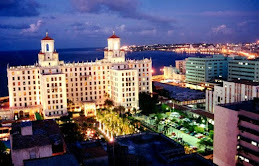
+azul.jpg)







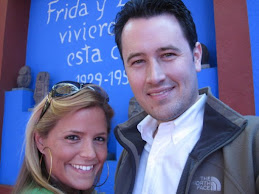.jpg)
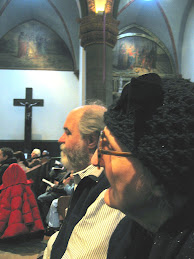

















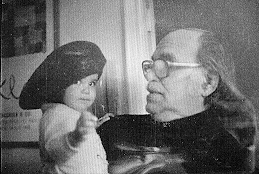.jpg)



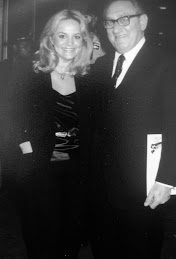.jpg)

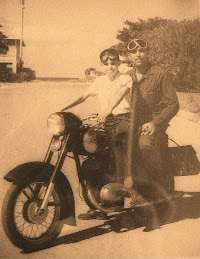.jpg)










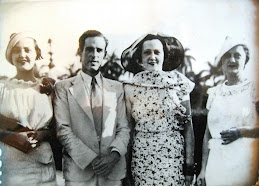

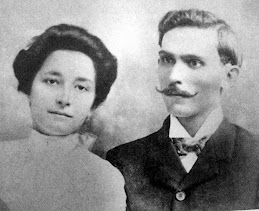
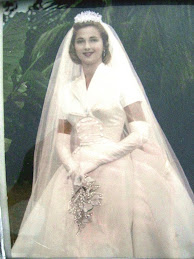
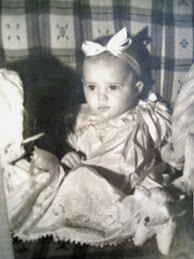
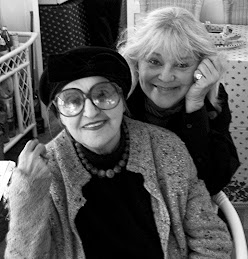
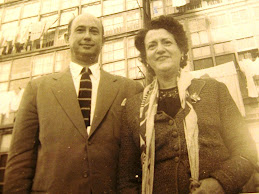
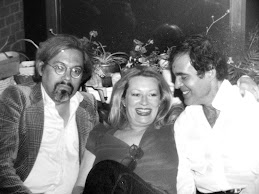
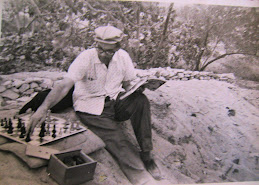
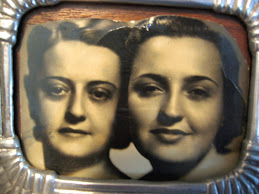
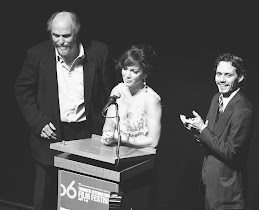
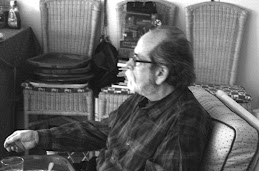
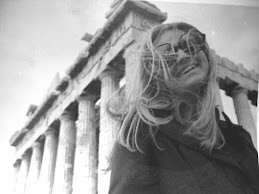

.jpg)

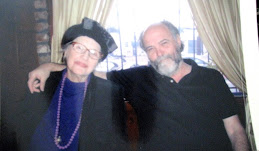
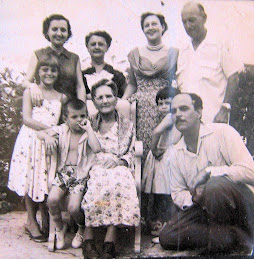
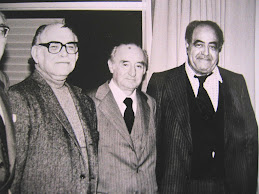
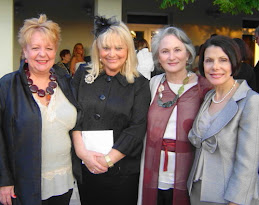

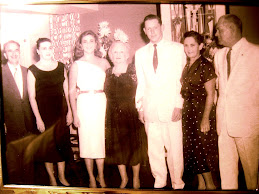
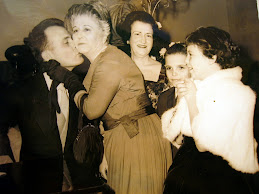

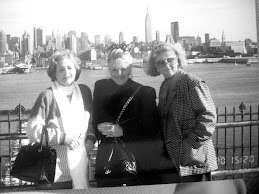

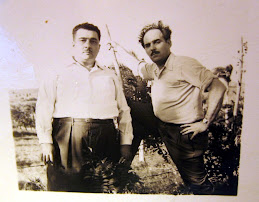
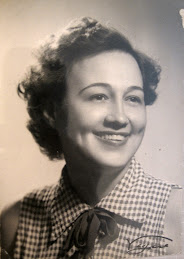
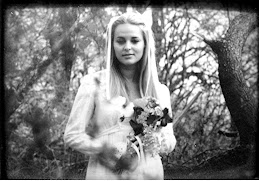
.jpg)
